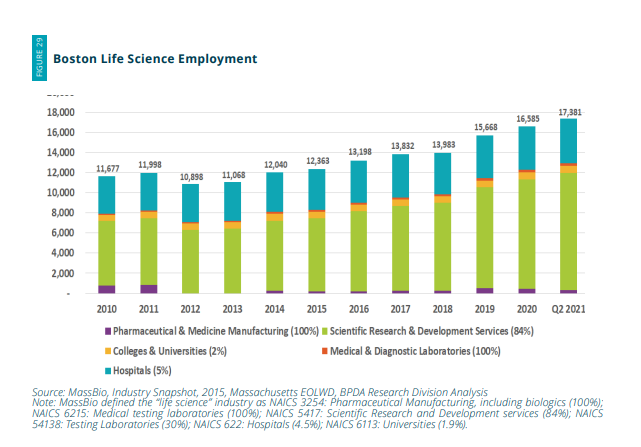
by Boston Planning & Development Agency, Research Division.
Driven in part by the COVID-19 pandemic, demand for biomedical research has strengthened growth trends in the life science industry in Boston, impacting both real estate and employment.
According to CBRE, the city of Boston has over 12 million square feet of life science lab space, with 4.8 million square feet in the Seaport and 2.7 million square feet in Allston/Brighton/Longwood. Demand for lab space has been incredibly strong. 2021 saw 1.3 million sq. ft. of positive absorption of life science space in Boston. At the end of 2021 rents for life science space were $103.24 per sq. ft. (NNN) in Boston and $104.49 per sq. ft. in the Seaport. Vacancy was almost nonexistent at 0.1 percent at the end of 2021. CBRE estimates that an additional 1.8 million square feet of newly constructed or converted lab space will be delivered in 2022.
The growth in the life science industry in Boston has been driving recent development trends, with new projects proposing lab/R&D space and previously approved projects proposing changes to pivot towards lab/R&D space. 88 Black Falcon Avenue, a new project in South Boston Waterfront, was approved in May 2021 and will add 327,600 square feet of lab space. Another new project, the 100 Hood Park Drive Addition in Charlestown, will add 151,700 square feet of lab space as well as ground floor retail. 321 Harrison, a previously approved office project that was already under construction, came back to the BPDA Board in July 2021, changing its primary square footage from office to lab space. This project will add 220,000 square feet of lab space to the South End. 321 Harrison is expected to deliver in late 2022 and is already more than half pre-leased. Parcel 12 in Back Bay was approved in 2019 as a mixed use development. In December 2021, the Parcel 12 developers returned to the BPDA Board to convert 118,191 square feet of the retail and office space into lab space. Overall, approximately 3.1 million square feet of research and development space was approved in 2021.
Boston’s dominance in the life science research field is reflected in research funding grants received from the National Institutes of Health (NIH). The NIH, under the U.S. Department of Health and Human Services, is the nation’s largest source of funding in biomedical research. Boston is the second highest NIH funded city in the nation. In FY 2021, Boston researchers received $2.4 billion in NIH funds, just behind New York City’s $2.9 billion. Cambridge, Massachusetts received $462.7 million in NIH funding.

